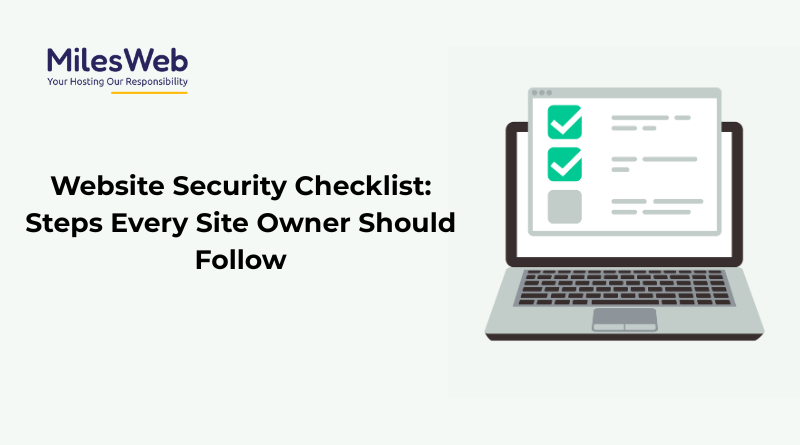Are you ever curious about how safe your website is? With increasing cyberattacks, many website owners using affordable cloud hosting services are searching for methods to safeguard their online presence. When your website isn’t secure, the risks go way beyond just technical issues.
A data breach can leak customer information, which might result in legal trouble and shake your audience’s trust. In some cases, it only takes one incident to damage your brand’s reputation. Plus, search engines notice—if your website gets compromised, you could lose visibility and see your traffic drop fast.
This article breaks down essential steps to make your website more secure. These methods go from simple practices to more sophisticated methods, appropriate for websites of every size. Whether you have a personal blog, use affordable cloud hosting, or have an eCommerce website, you will find useful tips to make your website more secure from online threats.
Proven Security Techniques That Work
1. Multi-Factor Authentication (MFA)
When generating passwords, go for length and complexity. A secure password should have a minimum of 12 characters, combining uppercase and lowercase alphabets, digits, and special characters. Avoid using personal details or easily predictable terms such as name or birthdate.
While strong passwords are a great beginning, multi-factor authentication (MFA) provides another level of security. MFA utilizes multiple methods to confirm your identity when you log into your account. They rely on a mix of factors—like a password you remember, a device you carry, or even your fingerprint—to confirm it’s really you.
Most WordPress security plugins provide MFA. The most popular methods are SMS codes delivered to your phone, authenticator apps that create time-based codes, hardware tokens, and biometric authentication. Try using MFA not only for your WordPress admin user but also for all users who have access to your website, including authors and contributors.
2. SSL Encryption
Secure Sockets Layer (SSL) and Transport Layer Security (TLS) are protocols that encrypt data transferred between a user’s browser and your website. This encryption guards sensitive information like login details, personal data, and banking information against intruders.
When an SSL certificate is deployed, your website’s URL is switched from “http://,” to “https://,” all major browsers render a padlock symbol in the address bar. This visual icon informs visitors that their connection with your website is secure and encrypted.
Apart from data safety, SSL/TLS certificates are useful in these other ways:
- SSL assures the credibility of your website and contributes to developing trust with the visitor.
- Most search engines prefer HTTPS websites, which could increase your SEO score.
- Some browsers alert visitors about non-HTTPS websites, which may drive away potential customers.
SSL/TLS implementation is easier than it seems. Reliable web hosting providers such as MilesWeb offer free SSL certificates with their offerings.
3. Web Application Firewall (WAF)
A Web Application Firewall (WAF) provides an added layer of security for your website. Its advantages are:
- Threat Prevention
It is programmed to recognize and block well-known attack patterns, like SQL injections, Cross-Site Scripting (XSS), and other recognized security threats.
- Real-Time Monitoring
WAFs offer real-time monitoring of your website’s traffic, enabling instant detection and mitigation of possible threats. Real-time protection helps you catch and handle security threats the moment they appear.
- Customizable Rules
You can customize your WAF settings according to your requirements. This freedom offers you the ability to design custom rules that cater to specific security needs or known problems specific to your website.
- Performance Optimization
Most WAFs feature caching functions, which may enhance your website’s loading speed and its overall performance.
- DDoS Protection
WAFs are also efficient at mitigating Distributed Denial of Service (DDoS) attacks, ensuring that your website remains accessible amid attempted attacks.
- Compliance Support
For companies that must comply with certain security standards, a WAF can help to achieve and sustain compliance with regulations such as GDPR or PCI DSS.
4. Database Security
Database security involves several best practices that can go a long way in hardening your website’s overall security:
- Set up strong passwords for your database and user accounts. Periodically change these for extra protection.
- Backup your database regularly. Backups, planned to run on a routine basis, can make this process more automatic and time-efficient.
- Verify and sanitize all user data before it gets to your database to avoid SQL injections.
- Implement prepared statements in your database queries so that SQL logic is isolated from data.
- Run periodic security scans on your database to look for possible vulnerabilities or symptoms of an attack.
- Encrypt confidential data within your database, particularly if dealing with classified data subject to regulations such as GDPR.
5. Use a Reliable Hosting Provider
An ideal web host offers an optimized infrastructure, periodic updates, and proactive monitoring for deterring threats. When choosing a web host, look for web hosts that provide numerous features such as firewalls, intrusion detection systems, automated security scans, WAF, and much more.
MilesWeb provides a secure hosting platform for growing businesses delivering strong security features at the most cost-effective rates. Their managed hosting offers automated security updates and patches, along with malware scanning and removal. Such features serve as frontline protection against different attacks, including DDoS attacks.
Server settings are the core aspect of website security. An ideal web host is always prepared for security optimizations, with settings to maximize both productivity and security. One aspect of server security that is not as highly regarded as it should be is input validation. Although client-side checks are valuable, server-side validation provides a more secure defence against malicious input.
Conclusion
Securing your website can feel overwhelming, but it’s worth it to safeguard your online presence. From passwords and multi-factor authentication to protecting databases and defending against general web attacks, there’s much to take into account.
MilesWeb’s managed hosting solutions meet most of these security needs. Their secure environment, reliable backups, malware scanning, and server-level optimization techniques create a robust groundwork for website security and you can check out MilesWeb’s affordable and secure web hosting plans to move to a secure online presence!





